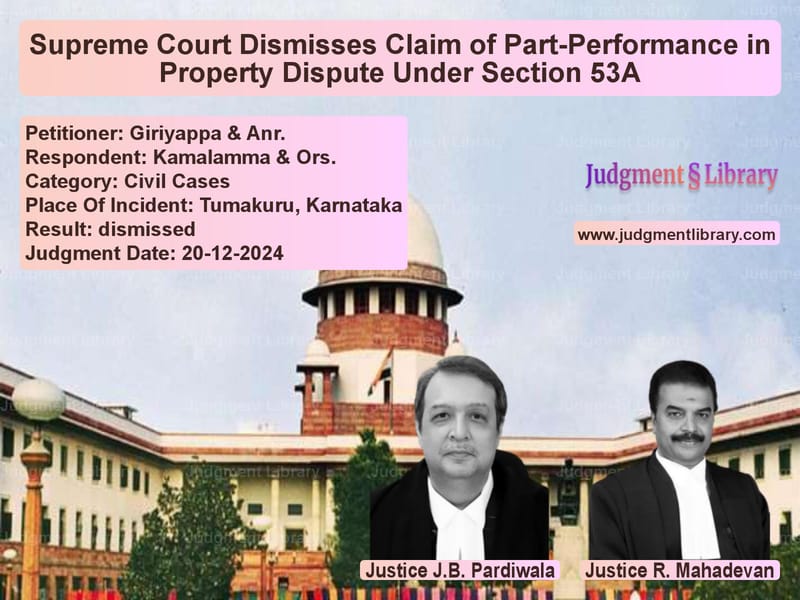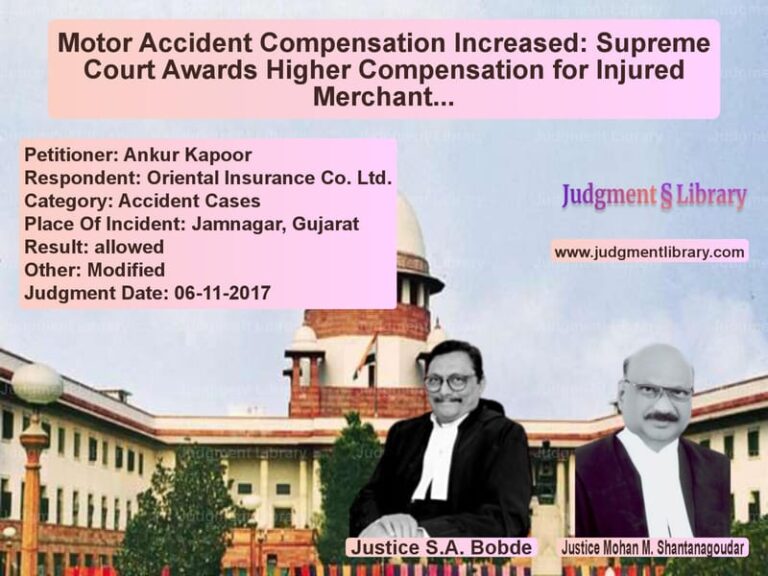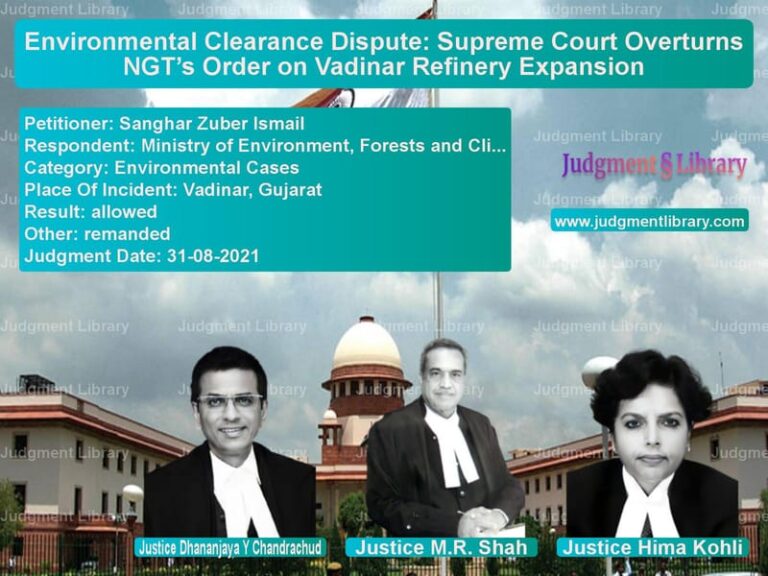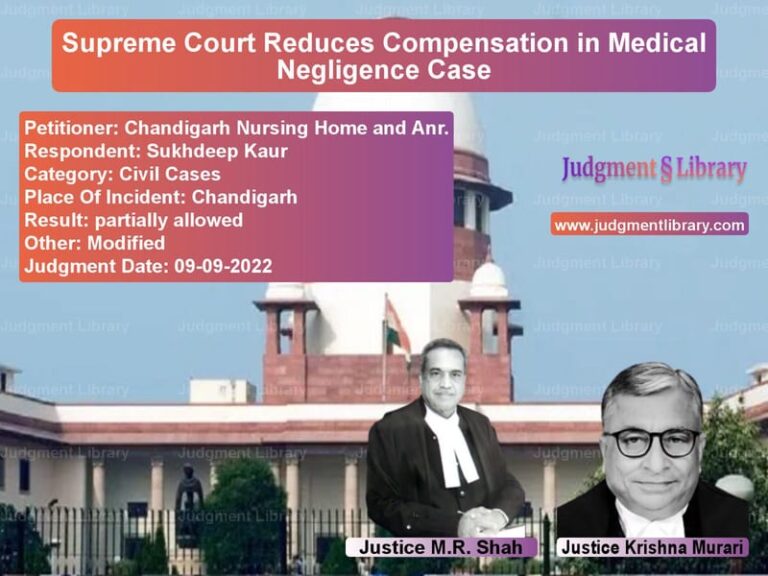Supreme Court Dismisses Claim of Part-Performance in Property Dispute Under Section 53A
The Supreme Court of India recently delivered a significant judgment in the case of Giriyappa & Anr. v. Kamalamma & Ors., clarifying the application of Section 53A of the Transfer of Property Act regarding the doctrine of part-performance in property transactions. The Court ruled that mere possession and an unregistered sale agreement do not entitle a party to claim protection under Section 53A if the essential conditions are not met.
Background of the Case
The case involved a dispute over a piece of land. The respondents (original plaintiffs) had filed Original Suit No. 364/1988 seeking a declaration of title and recovery of possession from the petitioners (original defendants). The trial court ruled in favor of the plaintiffs, affirming their ownership and ordering the defendants to vacate the property.
Read also: https://judgmentlibrary.com/supreme-court-upholds-possession-rights-in-karnataka-property-dispute/
The defendants filed an appeal, which was dismissed by the First Appellate Court. Subsequently, the Karnataka High Court also dismissed their Regular Second Appeal No. 1740/2008, affirming the lower courts’ decisions. Dissatisfied, the defendants approached the Supreme Court, arguing that they were protected under Section 53A of the Transfer of Property Act based on a sale agreement executed in 1968.
Key Legal Issues
- Whether an unregistered sale agreement executed in 1968 provided the defendants protection under Section 53A of the Transfer of Property Act.
- Whether the defendants could retain possession of the property despite the lack of a formal transfer of ownership.
- The significance of compliance with statutory requirements for invoking the doctrine of part-performance.
Arguments by the Petitioners (Defendants)
The petitioners contended:
- The plaintiffs had executed a sale agreement on November 25, 1968, agreeing to transfer 2 guntas of land to them for a total consideration of ₹850.
- Since then, they had been in possession and enjoyment of the property.
- Under Section 53A of the Transfer of Property Act, they were entitled to protection against eviction.
- The plaintiffs had allowed them to remain in possession, and their subsequent claim of ownership was unjust.
Arguments by the Respondents (Plaintiffs)
The respondents countered:
- The alleged sale agreement was unregistered and unenforceable.
- The petitioners had failed to prove that the agreement was valid and legally executed.
- The petitioners had illegally occupied the property in 1983-84, long after the supposed agreement.
- The defendants had earlier attempted to claim occupancy rights before the Land Tribunal, Tumakuru, but their claim was dismissed in 1987, and they had no legal basis to retain possession.
Supreme Court’s Observations
The Supreme Court upheld the findings of the lower courts and dismissed the appeal. The Court referred to the conditions required to invoke Section 53A of the Transfer of Property Act and emphasized:
“When the defendant has failed to prove that plaintiff has executed the Sale Agreement dated 25.11.1968 agreeing to sell 2 guntas out of survey No. 24/9 and he came in possession and occupation of suit schedule property by virtue of the same, question of providing protection under Section 53A of the T.P. Act does not arise.”
The Court also rejected the petitioners’ reliance on the case Shrimant Shamrao Suryavanshi v. Pralhad Bhairoba Suryavanshi (2002), stating:
“The ratio in the decision of the Hon’ble Supreme Court in the case of Shrimant Shamrao Suryavanshi is not applicable to the case on hand.”
The Supreme Court outlined the essential conditions to claim protection under Section 53A:
- There must be a written contract signed by the transferor for the sale of immovable property.
- The transferee must have taken possession in part-performance of the contract or continued in possession.
- The transferee must have performed or be willing to perform their part of the contract.
The Court observed that the petitioners failed to meet these requirements, particularly:
- The sale agreement was not registered, making it legally unenforceable.
- The defendants did not demonstrate that they had fulfilled their obligations under the agreement.
- They had no legal right to remain in possession once their claim was rejected by the Land Tribunal.
Final Judgment
The Supreme Court dismissed the petition, holding:
“Section 53-A is an exception to the provisions which require a contract to be in writing and registered and which bar proof of such contract by any other evidence. Consequently, the exception must be strictly construed.”
Since the petitioners could not establish a legally valid agreement or fulfill the conditions for part-performance, the Court ruled in favor of the respondents.
Implications of the Judgment
This ruling has significant implications for property law and real estate transactions:
- Importance of Registration: Unregistered sale agreements do not confer legal protection or ownership rights.
- Strict Compliance with Section 53A: The doctrine of part-performance cannot be invoked without meeting all statutory conditions.
- Prevention of Illegal Possession: Mere long-term possession does not override legal ownership if possession was obtained unlawfully.
- Judicial Consistency: The judgment reinforces previous rulings emphasizing the necessity of proper documentation in property transactions.
Conclusion
The Supreme Court’s decision in Giriyappa & Anr. v. Kamalamma & Ors. serves as a landmark ruling on the enforcement of property agreements. By strictly interpreting Section 53A and rejecting claims based on an unregistered sale agreement, the Court has reinforced the principle that ownership rights must be legally documented and duly executed. This judgment provides a crucial precedent for property disputes, ensuring that legal safeguards are upheld and preventing misuse of the doctrine of part-performance.
Petitioner Name: Giriyappa & Anr..Respondent Name: Kamalamma & Ors..Judgment By: Justice J.B. Pardiwala, Justice R. Mahadevan.Place Of Incident: Tumakuru, Karnataka.Judgment Date: 20-12-2024.
Don’t miss out on the full details! Download the complete judgment in PDF format below and gain valuable insights instantly!
Download Judgment: giriyappa-&-anr.-vs-kamalamma-&-ors.-supreme-court-of-india-judgment-dated-20-12-2024.pdf
Directly Download Judgment: Directly download this Judgment
See all petitions in Property Disputes
See all petitions in Specific Performance
See all petitions in Judgment by J.B. Pardiwala
See all petitions in Judgment by R. Mahadevan
See all petitions in dismissed
See all petitions in supreme court of India judgments December 2024
See all petitions in 2024 judgments
See all posts in Civil Cases Category
See all allowed petitions in Civil Cases Category
See all Dismissed petitions in Civil Cases Category
See all partially allowed petitions in Civil Cases Category







